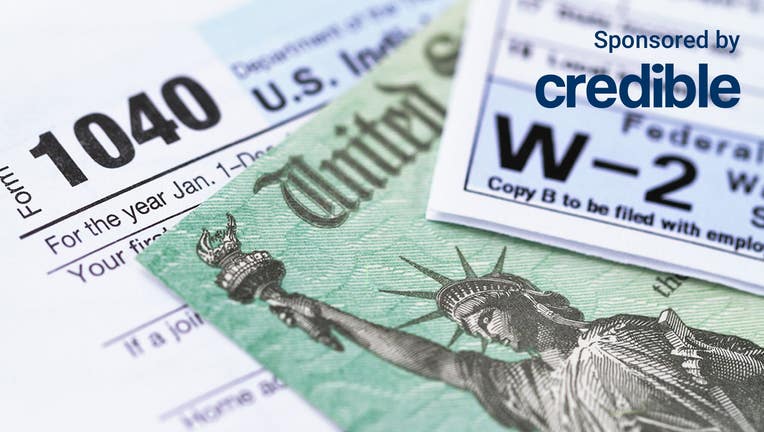Here is how you can avoid a tax refund shock next year

Americans should assess their income tax health now to avoid any shocks next tax season, a recent Jackson Hewitt report said. (iStock)
Many Americans got smaller-than-expected tax refunds this year, but with some planning, they can avoid this shock in the upcoming tax year, according to a recent Jackson Hewitt report.
The average tax refund amount reported by the Internal Revenue Service (IRS) as of May 5 was $2,803. This is more than a 7% drop from the average refund amount last year, which averaged $3,025.
The difference results from several changes announced by the IRS that ended pandemic-era tax credits that reduced the advance amount for many. The Child Tax Credit (CTC), Earned Income Tax Credit (EITC) and Child and Dependent Care Credit were among the affected credits.
"Many Americans experienced smaller tax refunds this past tax season, and in many cases, there was an increase in people owing balances due compared to last year, " Jackson Hewitt Chief Tax Information Officer Mark Steber said. "Next year’s Tax Day might look very similar for many taxpayers if they don’t take immediate action now to make adjustments.
"Taxpayers have more control over their tax return than you might think, but it’s necessary to keep ahead of financial and life changes that can impact you and your family, so you avoid refund shock and manage expectations at tax time," Steber continued.
If you received a smaller refund this tax season and are struggling to pay down debt, you could consider consolidating it with a personal loan. Credible can help you find your personalized interest rate without affecting your credit score.
Most consumers aren't sold on the benefits of Buy Now, Pay Later: report
A mid-year check can help boost your refund potential
One way Americans can avoid being caught off guard next tax season is by conducting a thorough review of their tax return alongside a mid-year review of their income so far in 2023, Jackson Hewitt said. This can help Americans compare the basic facts.
Tax filers should also take note now of any notable personal changes — like a change in dependents, employment status, new or different earnings or gains, as well as getting married or divorced — these are examples that can impact what you should be paying in taxes, according to the Jackson Hewitt report.
Undergoing a mid-year assessment can help taxpayers estimate how much they will receive in tax refunds or what sort of balance they will owe next tax season. It is also a good time to make changes that can help minimize balances by altering tax withholdings, increasing retirement contributions, and other strategies, according to Jackson Hewitt.
Self-employed taxpayers should pay particular attention to updated tax laws that apply to the use of third-party payment apps like Venmo, Zelle and PayPal for business payments, according to Jackson Hewitt.
Small businesses and people with side hustles will receive a 1099-K form that shows their income and the number of transactions of more than $600 made with third-party settlement organizations (TPSOs) like PayPal and Venmo in 2023. Previously these users didn’t receive a form from the vendor unless they accepted $20,000 or more.
"Taxpayers have experienced many changes in the last few tax filing seasons," Steber said. "During the height of the pandemic, many taxpayers benefited from stimulus payments and increased tax credits, but this past tax season was reflective of what filing was before 2020.
"We expect this year’s tax filing to be a similar experience and are recommending to all of our clients to do a mid-year planning session with their Tax Pro to make sure they better understand their situation and to plan for any changes during the remainder of the year," Steber continued.
If you are looking to reduce your expenses amid high inflation, you could consider using a personal loan to pay down debt at a lower interest rate, saving you money each month. You can visit Credible to find your personalized interest rate without affecting your credit score.
Here's how to sign up for Biden's new student loan repayment plan SAVE
IRS will go paperless by 2025
The IRS announced that it will go paperless by filing season 2025. By the next tax season, taxpayers can digitally submit all correspondence, non-tax forms, and responses to notices. Right now, taxpayers can submit annual 1040 tax returns digitally, but nearly all correspondence with the IRS must be done through regular mail.
The IRS will also be adding more non-tax forms in digital, mobile-friendly formats, making it easier for taxpayers to complete and submit. The changes should help taxpayers access refunds sooner.
The IRS is also working on a direct file program allowing taxpayers to file their tax returns electronically, side-stepping third-party software like TurboTax.
"Minimizing the need for paper-filed tax returns should be a top priority, and the IRS is taking this issue head-on," Betterment Head of Tax Eric Bronnenkant said in a statement. "There are still too many reasons taxpayers need to paper file their returns because they need to attach some sort of document to their return. Enabling attachments of required supporting documents will reduce millions of hours of headache and frustration dealing with USPS/UPS/FEDEX."
Americans sometimes use tax refunds to help pay down credit card debt. If you are expecting a smaller refund in 2024, a personal loan can help pay down high-interest debt. Contact Credible to speak to a loan expert and get all of your questions answered.
Cost is the biggest factor behind why a majority of Americans delay medical care: survey
Have a finance-related question, but don't know who to ask? Email The Credible Money Expert at moneyexpert@credible.com and your question might be answered by Credible in our Money Expert column.

